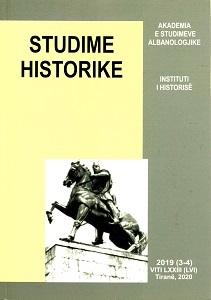QËNDRIMII AUTORITETEVE AUSTRO-HUNGAREZE NDAJ POPULLSISË DHE KLERIT MYSLIMAN SHQIPTAR GJATË VITEVE 1916-1918
THE ATTITUDE OF THE AUSTRO-HUNGARIAN AUTHORITIES TOWARDS THE ALBANIAN MUSLIM POPULATION AND ITS CLERGY DURING 1916-1918
Author(s): Sali KadriaSubject(s): Governance, Diplomatic history, Political history, Social history, Sociology of Religion, Geopolitics
Published by: Qendra e Studimeve Albanologjike
Keywords: Austro-Hungarian authorities; 1916-1918; Albanian Muslim population; history;
Summary/Abstract: The attitude of the The article deals with the relations built by the Austro-Hungarian military and civilian authorities during 1916-1918, in relation to the Muslim and Catholic populations as well as the respective clergy. The author expresses the opinion that Austria-Hungary followed two lines of attitude towards religious beliefs in Albania. On the one hand, the Austro-Hungarian military authorities despised the Albanian Muslim population and tended to side with the Catholic population. On the other hand, the civil authorities and in particular the Civil Commissioner August Ritter von Kral tried to take into account the religious relations within the country, as they were clear that maintaining a unilateral stance could trigger a civil civil war in Albania. Even regarding the issue of the independence of the Albanian Muslim clergy, there was a difference in the attitude held by the military and civil authorities. The leading military circles were for the establishment of the Albanian Muslim clergy under the subordination of Reis-Ul-Ulema of Sarajevo in Bosnia. Meanwhile, the Austro-Hungarian Foreign Affairs Minister Stephan Burian von Rajecz and the Civil Commissioner Kral drafted the project for the appointment of an Albanian chief mufti to direct the affairs of the Muslim religion in Albania. At the beginning of the occupation of Albania, Vienna expressed reluctance to the idea of appointing a local chief mufti in this country. However, from the autumn of 1916 to the end of 1918, Austro-Hungarian civil authorities worked tirelessly and uninterruptedly for the independence of Muslim Albanians from the dependence of Sheikh ul-Islam of Istanbul, increasing the level of preparation and national awareness of the Albanian Muslim clergy, as well as for the institutionalization and consolidation of the structure of the Mufti of Albania. and its clergy during 1916-1918
Journal: Studime Historike
- Issue Year: 2019
- Issue No: 03-04
- Page Range: 107-132
- Page Count: 26
- Language: Albanian
- Content File-PDF

